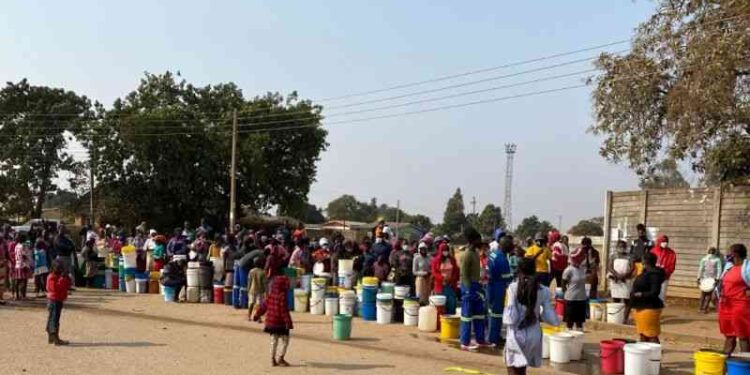Harare’s water challenges have pushed several women in high-density suburbs to the brink of poverty as they now have less time to spare for economic activities.
This came to light on the sidelines of the Borehole Diaries, an event hosted by Shamwari YeMwanasikana at various Chitungwiza water collection points.
The programme is aimed at educating the public on the dangers of gender-based violence, with several women indicating that most of their time was being spent looking for water at community boreholes.
According to a report by the World Health Organisation (WHO), unsafe water as well as lack of toilets at home robs girls of their potential while compromising their well-being and perpetuating the cycles of poverty.
The report says the challenges made the implementation of water, sanitation and hygiene programmes difficult.
The programmes are critical to reaching universal access to water and sanitation and achieving gender equality and empowerment.
It further indicated that globally, 1,8 billion people live in households without water supplies, with women and girls aged 15 and older primarily responsible for water collection in seven out of 10 such households, compared with three in 10 households for their male peers.
WHO said in most cases, women and girls made longer journeys to collect water, losing time for education, work and leisure, and putting themselves at risk of physical injury and other dangers on the way.
Ottilia Zvanezuro (34), a resident in Chitungwiza, bemoaned the scarcity of water in the community, adding that it had ruined her ambitions.
“We spend the greater part of the day on these long water lines and it’s something that we have now been accustomed to,” Zvanezuro said.
“This is negatively impacting our businesses as we can’t be in two places at the same time. The moment you spend the whole day at the borehole, there will be no production at the vending stall or at the homestead.”
Another resident, Mia Katsukutsi, said many residents relied on a few water points in the area.
“We have a lot of sections from the community which rely on the water collection points, thereby taking us hours to fetch water,” she said.
“We spend the greater part of the day without even cleaning the house or attending to the vending stall thereby making us lose a lot of money which is an unfortunate situation as we rely on vending for livelihoods.”
“The water crisis not only spreads the cholera virus, but also robs us of the chance to embark on our day-to-day economic activities pushing us further into poverty.”
Shamwari YeMwanasikana executive director Ekenia Chifamba said they were embarking on several initiatives to ensure that women remained empowered and were cushioned from the effects of gender-based violence.
“We have a multi-stakeholder approach that we have established that involves key government ministries to allow for sustainability and continuity,” she said.
“Violation of women’s and girls’ rights does not only start at the boreholes. This is an issue that starts at the home set-up. They should be empowered enough to create safe spaces.”
Source NewsDay









